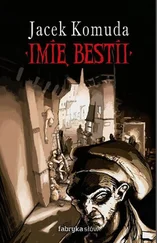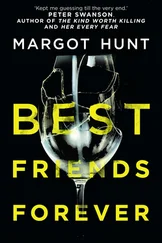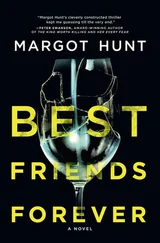1 ...8 9 10 12 13 14 ...17 Dr Valverde showered and changed in the locker room, then hurried to the nearly deserted cafeteria to have lunch. The menu for the day was rice, scrambled eggs, sweet potato, and boiled string beans. She chose one of the empty Formica-topped tables, pulled back a chair, sank on to it feeling tired. Then she spotted Captain Trujillo at the doorway, craning his neck in search of her. She waved at him. He came over.
‘You had lunch?’ she asked.
‘Not yet.’
‘Want to?’
Hesitatingly. ‘Can I? I assumed this was for IML people only.’
‘It is, but let’s see.’
She talked to the man in charge, Trujillo shelled out fifty cents, then advanced to the food counter. Dr Valverde was halfway through her lunch when he deposited his plastic tray on the table and shoved back the chair facing her.
‘Hey, thanks for speaking on my behalf. I’m famished,’ he said.
‘Least I could do. This is going begging anyway.’
‘Well, yeah, but something is better than nothing. When I get back to my mess hall there might be nothing left.’
‘Enjoy it then.’
Trujillo gobbled his food and they finished simultaneously. After leaving the two dirty trays and the cutlery by a serving hatch near the food counter, the captain joined the pathologist. She had been waiting for him on a granite bench in the hallway. She extended her packet of Populares, he reached for one, then clicked his lighter for her. Both inhaled deeply.
‘No ID, no sexual intercourse, was killed around midnight,’ she reported.
Trujillo tilted his head. ‘Anything else?’ he asked.
‘What appears to be four fixes of cocaine,’ she replied between gusts of smoke.
Trujillo frowned and they smoked in silence for a minute or two. In the last seventy-two hours he had slept twelve, hadn’t had a change of clothes for the last two days, had been reprimanded by the colonel for skipping the last three Party-cell meetings, and was therefore in no mood to get involved in a complicated murder case. And he knew better than to suggest to Major Pena to pass the buck to someone else. The homicide had been reported during his shift, exactly thirty-seven minutes before he was to go off duty. Just his luck. If only it had been a crime of passion! One of those open-and-shut cases where the killer is found sobbing by the body, hanging by the neck in the vicinity, or hiding at his or her parents’.
‘Well, Doc, I’ll collect the ten-print and his things now, take them to the LCC. Please send the autopsy report as soon as possible.’
‘Sure. I don’t envy you, Captain. This is a tricky one.’
‘As if I didn’t know. Thanks for everything. Changing the subject, I’m stressed out, you’re probably stressed out too, would you…catch a movie or have dinner with me one of these nights?’
The pathologist gave him a disapproving look. ‘Felix, are you coming on to me? What’s the matter with you guys?’
‘Take it easy. I just thought you might want to. Somebody said you’re divorced. Aren’t you?’
‘Yes, I am. But you’re not. Give me a break, will you, Félix?’
Trujillo inclined his head and blushed slightly. How had she found out he was married? ‘Okay. I’m sorry. I apologize. Are you mad at me?’
‘No, I’m not. Got to make my watch report. Take care.’
At a quarter past two the inked fingerprint card was optically read by the LCC computer. The key features of the general pattern and local details provided a listing of candidates, ranked by a comparison algorithm. Online, the fingerprint examiner asked for seventy-two cards from the national registry and started the long screening process. At 7.50 p.m. he lifted his phone, dialled the DTI switchboard’s number, and asked for Trujillo. He had to wait six minutes while the captain left his bed in the communal dormitory for senior officers, relieved himself, splashed water on his face and, feeling reasonably alert at last, ambled to the phone on the duty officer’s desk.
‘Captain Trujillo, at your service.’
‘This is Captain Lorffe, from Fingerprints, LCC.’
‘Yes?’
‘You have a pen and paper?’
‘Just a minute.’
Trujillo searched his shirt pockets. He found a two-by-three-inch bus ticket and a ballpoint.
‘Okay.’
‘Pablo Carlos Miranda Garcés,’ Captain Lorffe dictated slowly. ‘A Cuban citizen. Born 17 August 1965, in Havana. The address on his identity record is 2406 Third A, between 24th and 26th Streets, Miramar, Playa.’
Trujillo copied everything down, then confirmed he’d got it right. ‘Okay. Thanks. Now, Captain, I mean no disrespect, but that ten-print was taken from a cadaver. I’ve got to notify the relatives. Any chance of mistaken identity?’
Trujillo heard Lorffe sigh. ‘The card I’ve got has the prints of Pablo Carlos Miranda Garcés. There are more corresponding simple ridge characteristics than I’ve got hairs on my head. Now, if someone at the Identity Card office in Playa fucked up and misfiled this guy’s original impressions; if you left the IML card on your desk and somebody changed it; if someone…’
‘I hope nothing like that happened,’ Trujillo cut in. ‘Thanks a lot, comrade.’
Back in the dormitory, the DTI captain grabbed his briefcase, pocketed the key ring found on the corpse, had supper in the mess hall, then asked for a Lada from the car pool, got a Ural Russian motorcycle with sidecar, and rode to Miramar. First he questioned the man in charge of surveillance in the CDR. * José Kuan lived around the block from Pablo Miranda, on 26th between Third and Third A.
Kuan was the son of Chinese immigrants and appeared to be in his late thirties, so Trujillo estimated he was probably in his early fifties. He had moved to the neighbourhood in 1992, to a third-floor apartment with his wife and two boys, both under ten, and was assistant manager at a state-owned enterprise that marketed handcrafts. Kuan’s children were watching TV in the living room, so he walked Trujillo to the couple’s bedroom. His wife brought the captain a cup of espresso which he accepted gratefully. Then she retired to the kitchen to do the dishes.
Yes, a man named Pablo Carlos Miranda Garcés lived around the block, Kuan admitted; he knew the guy: he was short, bald, worked at a joint venture two blocks away. Trujillo wrote down the name and address of the firm in his diary. No, he hadn’t seen him in the last few days. No, he wasn’t married, far as he could tell; lived with his sister. No, she wasn’t married either. Nobody else lived there.
Trujillo asked to see the Register of Addresses. Kuan opened a closet and produced an 81/2 x 13” file, with a page for each household in the area covered by the CDR. The one corresponding to the dead man’s apartment also had the name Elena Miranda Garcés inscribed, and gave the woman’s date of birth as 19 September 1962. The name Gladys Garcés Benítez, born in 1938, had been crossed off in red ink in 1987 just after she moved to Zulueta, Villa Clara. Her surname was identical to the siblings’ second surname. If she was still alive, Trujillo calculated, their mother would be sixty-two now.
‘What can you tell me about this Pablo Miranda?’ Trujillo asked once he’d finished jotting down names and ages.
The man fidgeted with the pages of the Register, his eyes evading the cop’s, pulling down the corners of his mouth. After eleven years in the force, Trujillo had seen this body language time and time again. Men and women who don’t want to rat on neighbours, stumped for a reply. Then why do they accept the position? he used to ask himself when he was a rookie. Now he knew the answer: it was for fear that declining might be considered a disinclination to fulfil revolutionary duties, something with adverse implications.
Читать дальше












